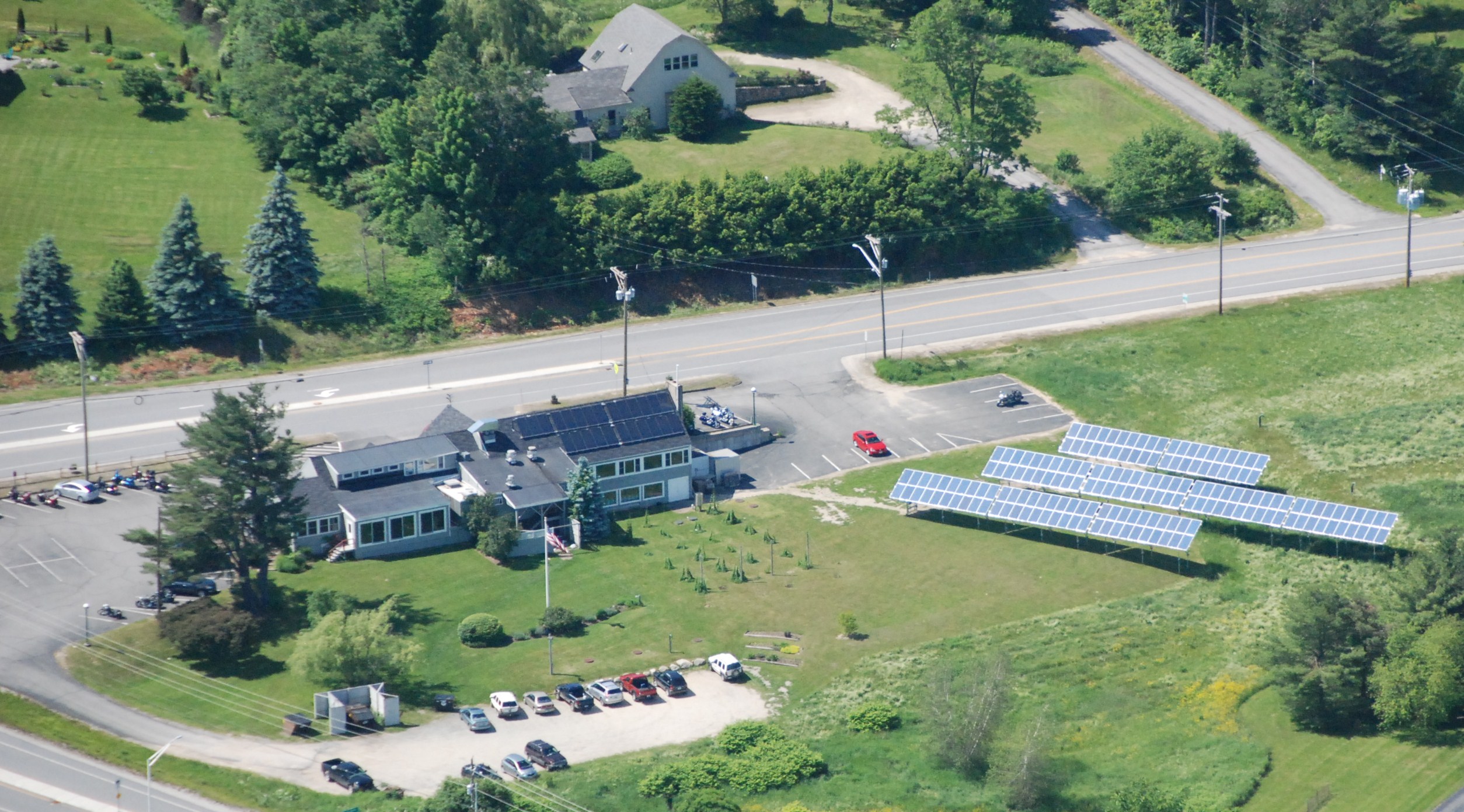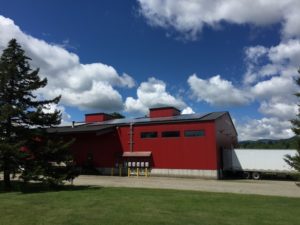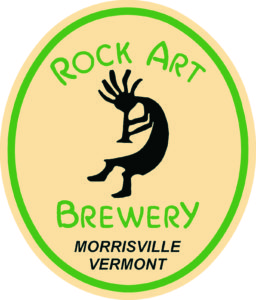Sustainability Comes In Many Flavors for Local Breweries and Distilleries

The Flying Goose Brew Pub & Grille is NH’s first solar-powered brewery. Courtesy photo.
By Chris Gillespie
Inspired by some of our favorite summer beverages, we at Green Energy Times decided to put together our own “seasonal sampler” to showcase how different craft brewers and distillers in our own backyard are having success going green. The production of alcoholic beverages presents many opportunities to use and benefit from renewable energy and sustainable methods and, as we found, many local owners are doing just that, each with his or her own unique approach. Cheers!
New Hampshire
Elm City Restaurant & Brewery: Supporting Local Farms and Implementing Responsible Environmental Practices
Located in the Colony Mill in Keene, Elm City Brewing Company has been brewing their award winning beers and serving freshly prepared lunch and dinner since 1995. Commitment to buying local, supporting local farms and caring for the environment plays a major role in the daily operations at the brewpub. The restaurant uses local eggs, milk, produce, meats & cheeses and maple syrup. The coffee is roasted locally at Keene’s Prime Roast.
The brewpub reduces waste by limiting packaging in their purchases, composting the preparation food waste, repurposing and recycling. Elm City filters their drinking water and does not sell bottled water. Manning Hill Farm drops off milk in refillable milk jugs. The same goes for the maple syrup containers from Maple Homestead Farms. The malts for the brewing process come in 50 pound grain sacks. The sacks are given to Stonewall Farm for reuse to package its compost. Used fry oil is picked up by a local family to fuel their cars. Elm City uses biodegradable to-go containers and paper bags.
There is no waste, transportation or packaging with the brewery. The beer is made and sold at the brewpub. Beer can be purchased in half gallon refillable containers called Growlers. The left over grain used in the brewing process is picked up by Manning Hill Farm when they deliver their milk and pick up the used milk bottles. They use the nutritious grain to feed their livestock.
Elm City purchases power from renewable resources to further its commitment to sustainability.
Flag Hill: Using Less to Gain More
For Flag Hill in Lee, New Hampshire, implementing sustainable practices “just makes sense,” according to Flag Hill owner Brian Ferguson.
Flag Hill is home to a vineyard, winery and distillery, as well as function halls. As Ferguson explained in a recent interview with Green Energy Times, a focus on sustainability has allowed him to keep his costs down as a small business owner. As they have found at Flag Hill, byproducts of one of their processes can actually be used to benefit a separate process.
For instance, Flag Hill grows their own grain, a practice that allows them to maintain high-quality product while eliminating additional transportation and energy costs. Once the locally sourced grain has been processed through the distillery, the team at Flag Hills uses the byproduct to feed their farm animals and for composting.
In addition to serving as a central point of their business, Flag Hill’s distillery also plays a significant role in how the facility is heated. Using a computerized heat recovery system, Flag Hill recaptures the heat that is created during the distillation process and redirects it to the domestic hot water tank, where the hot water can be used in their kitchen’s dishwasher. By recovering the heat in this way, Flag Hill reduces the amount of oil that they burn and the amount of water that they pull out of the ground, all while minimizing costs.
Since 2013, Flag Hill has also offered a “Bottle Buy-Back” program, which encourages patrons to return their empty Flag Hill liquor bottles to Flag Hill’s headquarters in exchange for store credit.
Flying Goose Brew Pub & Grille: Making History and Brews
The Flying Goose Brew Pub & Grille in New London, NH offers over seventeen handcrafted beers and a wide variety of family-friendly meals, all served in a rustic, yet energy efficient homestead that overlooks rolling green hills and The Flying Goose’s shimmering 41.4 kW solar photovoltaic array.
Founded in 1993 as a restaurant, the Flying Goose opened its brewery in 1996. In 2011, The Flying Goose made history by becoming the first brewery in the state of New Hampshire to utilize solar power and earned the town of New London’s Sustainable Business of the Year award. The array itself yields approximately a third of the Flying Goose’s energy needs.
In addition to the array, the Flying Goose also has 500 square feet of solar panels attached to the pub’s roof that generate enough energy to heat nearly half of the restaurant and brewery’s combined hot water needs. The rooftop array works in conjunction with a fully automatic wood pellet boiler that generates heat during the times when the solar energy is not enough.
“Even when the sun’s not producing, we’re still producing carbon-free energy,” Flying Goose owner Tom Mills recently told GET, adding that the carbon footprint of the wood pellet system is equal to that of a single tree decomposing in the woods.
As a small business owner, Mills has described Flying Goose’s switch to renewable energy as “a no-brainer,” citing the relatively quick return on investment and the various environmental benefits. He says that the Flying Goose is also looking into how to use the wastewater from their brewery to irrigate their hop garden. They are also exploring the idea of installing a wind turbine on the property.
Massachusetts

Barrington Brewery’s new solar PV system will produce 168,000 kilowatt hours annually. The 144kW PV system consists of 480 panels. Courtesy photo.
Barrington Brewery Celebrates a Decade of Solar Power with More Solar Power
In 2007, Barrington Brewery & Restaurant of Great Barrington, Massachusetts installed a 30-panel, solar hot water system on their roof and decreased their use of natural gas by 50%. The system meets the hot water needs of the brewery, as well as the demands of the sinks and dishwashers in both the restaurant and their banquet facility, Crissey Farm Banquet House.
On the ten year anniversary of this achievement, Barrington Brewery is significantly increasing their commitment to renewable energy with what co-owner Gary Happ describes as “the crown jewel of our greenness”: a 480-panel, 144 kW photovoltaic system.
As announced in a press release from this spring, Barrington Brewery’s new system will produce 168,000 kilowatt hours annually, providing 85% of both facilities’ energy needs. Based on data compiled by international solar energy advocates Solarplaza in November 2016, Barrington Brewery’s immense utilization of solar energy places them alongside the Top 20 Most Solar-Powered Breweries in the world. Guests stopping by to try one or more of Barrington Brewery’s twenty-plus homemade beers can view the photovoltaic array on the north side of the restaurant’s parking lot.
“We are on the front lines of environmental stewardship and [the] forefront of sustainable brewery initiatives,” said Barrington Brewery co-owner Andrew Mankin in the press release.
According to their website, in addition to their great success with solar power, Barrington Brewery also embraces sustainability by using the brewery’s spent grain to feed local cows and recycling all of their paper, cardboard, cans and glass.
Bicycles and Brews at The People’s Pint
At The People’s Pint in Greenfield, Massachusetts, riding your bike to dinner has two meanings.
Since 2003, The People’s Pint has offered their Bike to Live program, which encourages patrons to ride their bikes instead of driving vehicles when possible. Participants in the program must log the miles that they commute on their bikes and, after their first 100 miles, they receive a $25 gift card to The People’s Pint’s restaurant. After that, participants receive a one dollar credit for every 20 miles that they forgo their cars. As noted on The People’s Pint’s website, Bike to Live’s members have traveled over 63,000 miles on their bicycles.
Along with Bike to Live, The People’s Pint also advocates for reducing transportation-related carbon emissions through their partnership with MassBike, an organization that works to make bicycling more accessible and prevalent in Bay State communities. A percentage of The People’s Pint’s sales from their American Session Ale called Training Wheels go directly to MassBike.
In addition to their love of bicycles, The People’s Pint is equally passionate about reducing the amount of waste that they produce. In fact, according to their website, even on their busiest nights, they do not dispose of more than one barrel of trash. The team accomplishes this by only using a minimum of paper products, composting all kitchen and dining room food scraps and recycling all plastic, cardboard, paper, glass and metal.
Vermont
PurposeEnergy Helps South Burlington Brewery Do Magic
For nearly two years, PurposeEnergy from Woburn, Massachusetts has helped Magic Hat Brewing Company in South Burlington, VT reduce its energy consumption and purify their wastewater using their signature Tribrid Bioreactor.
As reported in the October 2015 edition of Green Energy Times, Magic Hat yields between nine and 150 gallons of byproduct wastewater for each barrel of beer they produce. PurposeEnergy’s Tribrid Bioreactor takes all of this wastewater and removes the pollutants and organic waste from it and then turns that organic waste into bio-gas-derived electricity and high-nutrient fertilizer. Magic Hat then uses the bio-gas-derived electricity to satisfy between 30 and 40% of the brewery’s electricity requirements while local farmers use the fertilizer to grow corn and beans. The newly-cleaned water leaves the facility and returns to the Lake Champlain watershed with significantly fewer pollutants, all thanks to the magic of PurposeEnergy’s Tribrid Bioreactor.
Rock Art Brewery Goes Solar
Rock Art Brewery in Morrisville, VT made state history this year when it became the first brewery in Vermont to switch to one hundred percent solar energy. Starting this summer, all of the beer that the 20 year-old, family-owned brewery produces will be powered by a 200 panel, 67 kW solar grid. Rock Art is celebrating the occasion with a new, limited edition IPA called SunRocked.
“Beer brewing and packaging uses a lot of energy,” said Rock Art Brewery co-owner Matt Nadeau in a recent press release. “We’re always looking for ways to reduce our environmental impact and solar was a perfect fit. We can run our machinery on the sun—why not?”
Rock Art’s commitment to renewable energy has gained them statewide attention, including from Melissa Corbin, the Executive Director of the Vermont Brewers Association, who has described Rock Art as “leading the pack” in terms of breweries in the state and country who are aiming to reduce their carbon footprint. By using solar energy, Rock Art will conserve the same amount of energy that is used annually by ten average-sized Vermont homes.
New York
Sundog Cider’s Hard Cider Is Sustainable to the Core
Sundog Cider’s factory in Chatham, New York is 100% solar powered and carbon neutral as a result of their use of vegetable oils, upstate New York’s first solar-powered air conditioner and a 128 kW solar array. Looking to continue their exploration of groundbreaking sustainable technology, Sundog is currently looking into ways of sequestering the carbon dioxide from the fermentation process back into their hard cider in the form of carbonation.
Chris Gillespie is a contributing writer for the Green Energy Times. He can be reached at chris@greenenergytimes.org.










Leave a Reply